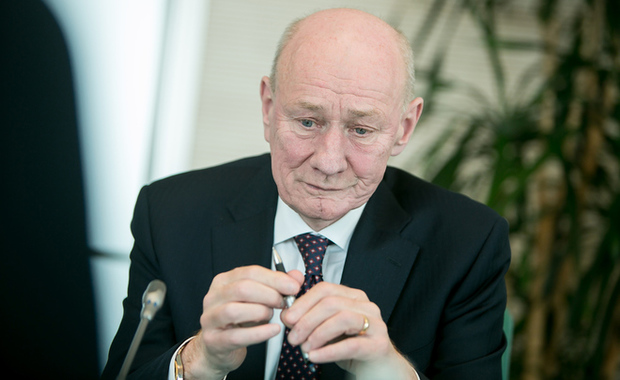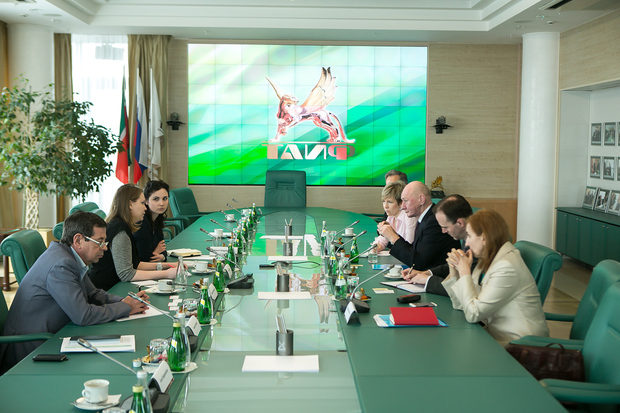John Derbyshire, KBR T&C: Global crude slate is trending towards heavier crudes, demand for fuel oil is declining
KBR is a global technology, engineering, procurement and construction company serving the hydrocarbons and government services industries. With operations in 40 countries, KBR has more than 22,000 people delivering services to customers in over 80 countries. Through its Technology & Consulting division (T&C), KBR offers proprietary technologies, early engineering and consulting services throughout the hydrocarbons value chain – from offshore oil & gas to specialty chemicals. In Tatarstan, the company provides VCC™ Process as the basis for an ambitious advanced heavy residue processing project at TAIF-NK. Start-up of the processing facility is scheduled to take place this fall, and John Derbyshire, President of KBR T&C, came to Kazan from the global energy capital, Houston, TX, to discuss the progress of the project to-date. Realnoe Vremya newspaper interviewed the executive from the US-based company about the company's interests in Russia, the factors that influence the global economy, about what the oil supplies from Iraq and Libya depend on and the advantages of the VCC Process.
Sanctions affects KBR work in Russia
Mr. Derbyshire, what interests does KBR T&C have in Russia?
One of the areas of particular interest is the fertilizer industry. The company has over 20 ammonia projects in Russia, and ammonia is a major component for fertilizers. We also build ethylene plants, and there are some projects to build such plants in Russia.
What companies do you work with on these projects, or are there any similar projects planned?
Out primary ammonia projects are with Eurochem. We are also working with ToAz on development of a revamp project.
Early in March, the US and the EU extended their sanctions against Russia. How did this affect the joint projects in Russia?
Yes, this affects KBR's activities in Russia generally and specifically regarding certain companies and clients.
Early this year, industrial activity in Russia showed certain signs of recovery. Working around the globe, what trends do you observe, how does the industrial sector in different countries feel?
Various changes are taking place, and, probably, the main one is the slowdown of the Chinese economy. Oil exporters, including Russia and the Middle East, have experienced some downturn due to declining oil prices. Also, instability in the Middle East affects oil supplies, for example, from Iraq and Libya. If these conflicts are resolved, the amount of oil supplied may increase. Also, as sanctions against Iran are lifted, the country will export more oil and gas. All these forces affect the global energy situation.

Various changes are taking place, and, probably, the main one is the slowdown of the Chinese economy.
Last month oil prices recovered a little. However, what do you think are the causes of oil price instability and how can market manipulations be prevented?
I don't believe there is any particular group manipulating oil prices. If the major producing countries cut oil production, the reduced supply will increase oil prices. Naturally, Russia, the Middle East and other countries depending on oil prices will benefit.
'People of different backgrounds came together on the same site'
Your company implements projects in remote regions with extreme environmental conditions. Please, tell us about any landmark project.
For example, we have just launched a fertilizer plant in Bangladesh. It is a very remote region of the world, and we worked with a Chinese contractor on this project. People of different backgrounds and different countries – the US, China, Bangladesh – came together on the same site to implement a joint project. And the common ground for all the three companies was the desire to successfully implement the project. Fortunately, the facility was launched on schedule and within budget and is now operating at the design capacity.
This is rather an example of a major transnational project. And what about an example of harsh environmental conditions?
Probably the most difficult projects in terms of climate were the projects in the Middle East, in the desert, in Saudi Arabia or Qatar, where temperature can rise to 120 degrees Fahrenheit or 49 degrees Celsius. It is sometimes easier for us to work in a cold climate such as Russia and China than in the heat of a desert. You can always get warm when it is cold, but there is no way to get rid of the heat.
The benefit of the huge refining residue resources
The TAIF-NK contract four years ago was the third licence for VCC Process since the company acquired the title for this technology in 2010. Where else was this process implemented?
The first pilot plant was built in Germany by Veba (now BP) about 35 years ago. After nearly 20 years of testing this unit was shut down because at the time the oil prices did not justify this type of technology. In 2009, when the oil prices increased again, BP built a new pilot plant unit in the US using this process, and in 2010 KBR became BP's partner for this process. The first plant based on this process was launched in China last year, but it is a relatively small-scale industrial unit. The TAIF complex is, in fact, the first large-scale commercial refining project based on this process.

It is sometimes easier for us to work in a cold climate such as Russia and China than in the heat of a desert. You can always get warm when it is cold, but there is no way to get rid of the heat.
Why did you decide to buy the licence from BP? What made this technology interesting?
The VCC process is uniquely placed to process Refinery heavy residues and is an ideal solution to convert these residues to clean fuels. With the global crude slate generally trending towards heavier crudes, and declining demand for fuel oil, we believe this process will be in high demand around the globe.
The experts in Tatarstan call this technology the most sophisticated in refining of crude. Do you agree?
Yes, indeed. The VCC process involves very high temperatures pressures, and it involves complex chemical reactions.
Accordingly, how reliable is this process?
In terms of chemical reactions, the process is very reliable. Since high temperatures and pressures are involved, the mechanical aspects of the plant require close attention. If not well maintained, they may cause concern. However these aspects were accounted for in the design of the equipment.
How long does a technology live? Are you already working to update it?
As I noted before, this process has existed for some time. The chemical part of this process is fairly clear and understood. Changes are only possible in terms of process temperature and pressure. As the construction processes and materials advance, we may be able to achieve higher temperatures to operate this process even more efficiently. At present, we have achieved improvements in materials and catalysts used in the reactions. KBR is continuously seeking to apply the best materials and catalysts to improve efficiency of the processes.
Your company is also a leading US Army contractor. What do you do for the military?
KBR's Government Services division provides logistics services for the Army: transportation, food supplies, and laundry services.

With operations in 40 countries, KBR has more than 22,000 people delivering services to customers in over 80 countries
Your company has a rich history. KBR had been part of a larger Halliburton Group since 1962. How did the company become independent in 2007?
Yes, we have a century of rich history. KBR was formed when M.W. Kellogg merged with Brown & Root Engineering and Construction creating one of the world's premiere engineering, procurement, construction (EPC) and services companies.
We spun off from Halliburton in 2007. Halliburton's primary activity had become provision of services for oil field drilling, while KBR has always been a more technology-oriented.
A stand-alone company since 2007, today KBR employs approximately 22,000 people globally with customers in more than 70 countries and operations in 40 countries.
In 2014, KBR streamlined our operations to focus on our core strengths as a global technology, engineering, procurement and construction company serving the hydrocarbons and government services industries across three distinct global businesses: Technology & Consulting, Engineering & Construction, and Government Services.